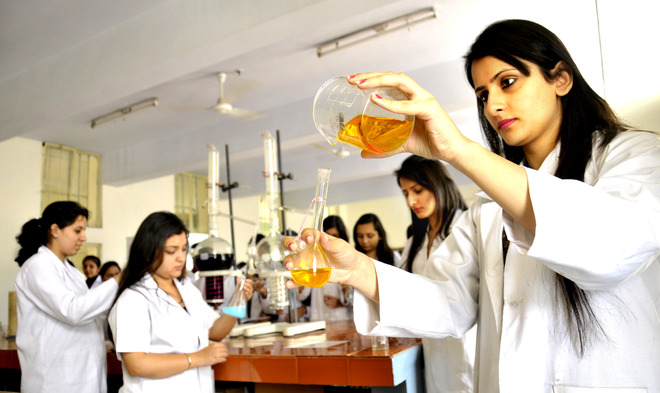
Biotechnology. Photo: Pradeep Tewari
Himani Swami
Simply put, biotechnology is a technology based on biology to harness cellular and biomolecular processes for developing mechanisms and products to improve our lives. Biotechnology is an umbrella term used for many in-depth subjects, such as biochemistry, microbiology, molecular biology, cell biology, immunology and immunotechnology, industrial biotechnology, designing operation of bioreactors, medical biotechnology, pharmacology and phamacogenetics, molecular modelling and drug designing, bioelectronics, gene analysis and cloning, DNA technology and forensic science.
It has influenced many industries like medical and healthcare, environmental conservation, food and agriculture, industrial research and development and chemical engineering. Modern biotechnology provides breakthrough technologies to combat rare diseases, reduce our environmental footprint, produce healthy food and cleaner energy.
It also underlines a plethora of functions performed by living organisms. This information can be used for developing a new product or improving an existing one. For instance, genetic engineering, a field of study under biotechnology, can revolutionise the way treatment of many lethal diseases is carried out. In the health sector, it increases the possibility of either replacing or inserting new DNA, which may have capabilities missing in the original DNA type.
Coming to its impact on environmental conservation, the science of biotechnology can be used to produce bioplastic, biogas and biodiesel. These products ease pressure on our natural resources because these can be easily degraded, reducing the negative affects these cause to our planet. Another significant part of biotechnology is agrobiotechnology, which can reduce the negative effects of insecticides and pesticides on crops and make the living conditions of livestock better.
Career wise
If you have an interest in biology, general science, technology, investigation, environment, you could be the best fit for the field. The growth of the industry over the years has caused a shift in the workforce needed to fill critical skill gaps, and many institutions now also offer courses to train biotechnology technicians.
A bachelor's programme in biotechnology looks at offering students with an understanding of the basic science that underpins biotechnology, including molecular biology and bioinformatics. It develops students' practical skills including information technology skills that will enable them to pursue careers in the biotechnology industry. The idea is to prepare students for jobs by developing transferable skills like self-management and reflective
practice, independence, communication, IT, numeracy, data analysis, interpersonal and teamwork skills, alongside an awareness of current issues, within the taught programme. A good course also encourages an understanding of the potential economic, ethical, and political impacts of modern biotechnology on society.
What would be the emerging future opportunities? What would an aspirant need to do in terms of courses and practical know how?
There are multiple career opportunities in biotechnology available today, ranging from sales and marketing, to research and development, to manufacturing and quality control. Additionally, there are many other occupations within biotechnology such as quality control, quality assurance, information technology, human resources, facilities, and infrastructure maintenance and manufacturing.
With the perpetual global demand for more efficacious therapeutics, environmental-friendly biofertilisers and economically viable biofuel, research and development activities in the biotechnology industry continue the upward trend. India, Indonesia, Australia, Singapore and China are in the forefront of this sector, with extensive investments and collaborations being put in place at the national as well as institutional levels, for newer and commercially viable breakthroughs in biotechnology.
The first step towards becoming a part of this burgeoning growth sector would be acquiring technical knowledge and skills crucial for a career in biotechnology from a recognised educational institution. A degree in biotechnology offers several career opportunities in areas like drug-design, medical biotechnology, food technology, genetic engineering, bioinformatics, forensic science and environmental management. Opportunities for qualified biotechnologists also exist in multinational companies, private enterprises, health sciences, research industry and educational institutions.
— The writer is the Head, School of Health and Life Sciences, Management Development Institute of Singapore.



























